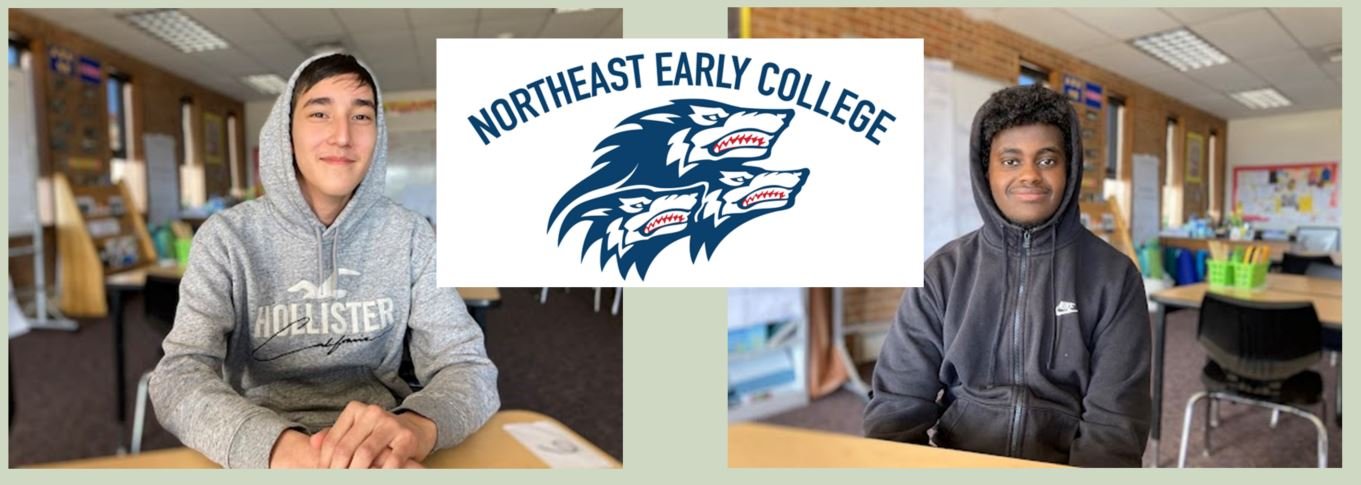Student Spotlight: Student-to-Student Feedback
Once a month the College Ready on Track team interviews a student at a school that is trying a change idea. This month we caught up with Surafel Alemayehu and Carlos Arroyo, 10th grade students at Northeast Early College. We asked them how they’ve been experienced math in the past and in the current year in their Calculus 1 class. Here’s what they said…
Carlos Arroyo (left) and Surafel Alemayehu are 10th grade students in Anamaria Criste’s calculus 1 class at Northeast Early College in the northeast region of Denver Public Schools.
Tell me about a time you felt successful in math? What happened? What made this a success?
Surafel Alemayehu: When I passed trigonometry because I do not like trig at all. I got through it with an A and was proud of myself. I would get confused on certain steps and it would cause me to go to different problems. Eventually, I started getting it down. The teacher was helping me out and one of my peers helped me out a lot. Most of it was me taking my time on it.
Carlos Arroyo: I would also say it was in trigonometry because it was difficult. My teacher helping me and some of my peers helped me finish it.
Tell me about a time when you found challenges in math? What happened? How did that feel? What do you wish had happened?
Surafel Alemayehu: At first, trig was challenging and I was not doing so well, but I take time on it and finally I will have a breakthrough and figure out this is how you do it. I don’t think math is challenging, it just takes time.
Carlos Arroyo: I would say at the beginning of this class, because I was afraid, but with the teacher’s help and with my friends, I was able to understand it.
What do you think about the changes that your teacher is trying in math class? (Student to student feedback protocol)
Surafel Alemayehu: I think it was pretty helpful because it allowed me to see what I would evaluate in myself versus how someone else would evaluate me. It allowed me to see what I could improve and change.
Carlos Arroyo: I liked it because it helped us get another opinion from someone else and learn from other people, not just the teacher.
“It’s too early to tell, but at the same time you can get a whiff of it…whenever Ms. Criste is teaching, it’s calm. But when we did peer evaluations there was some anxiety because it’s something new. I think that anxiety will go away.”
How did it feel?
Surafel Alemayehu: For me, I liked it and I felt happy to get constructive criticism. I was a little anxious to see how others would grade me.
Carlos Arroyo: Exciting and kind of scary because other people are going to grade you.
Finish this sentence, giving and getting feedback…
Surafel Alemayehu: is a helpful part of growth.
Carlos Arroyo: something good that helps you learn from your mistakes.
How is receiving feedback from a peer different from receiving feedback from your teacher?
Surafel: With a peer, it’s kind of difficult. If you don’t know them well, you will be judgmental of your own work and give yourself a harsher evaluation. But if you know them, you will see how they will improve it for you. It feels safer with a peer. Honestly, Ms Criste is an amazing teacher…this class in general is very open and has a calm air and that helps a lot. I think you’re friendlier with a peer.
Carlos. It feels different…if your peer is a friend, you wouldn’t be afraid…they can grade you harsher. People are not shy or afraid to ask their peers for help.
How has the protocol your teacher is using impacted the culture of your classroom?
Surafel Alemayehu: It’s too early to tell, but at the same time you can get a whiff of it…whenever Ms. Criste is teaching, it’s calm. But when we did peer evaluations there was some anxiety because it’s something new. I think that anxiety will go away…it’s like basketball, if you keep practicing and doing the same things, you’ll eventually accomplish what you’re trying to do and gain confidence.
Carlos Arroyo: I can tell that it gets people more comfortable with each other. That would help them if they have questions.
What would make math class better?
Surafel Alemayehu: In another class, we walked around and would attempt to solve problems in there…each person would try to solve one problem, but you could ask your peers for help and get there feedback on how to solve the problem…this was really helpful. We would rotate and erase what you write before going to the next problem.
Carlos Arroyo: I feel like math class is pretty good. We have a really good teacher. I actually learn math from her.
Is there anything else you’d want us to know about the use of student to student feedback protocols in your math class?
Surafel: Keep on doing it. It takes people out of their comfort zone and helps them do their work better and get things accomplished. That way, they will have someone to lean on if they ever need help. You are going to have to work with people later in life and getting out of your comfort zone and working with and getting feedback from others will help in the long run.
Carlos: Keep on doing it. It’s something that actually helps and supports the students.

